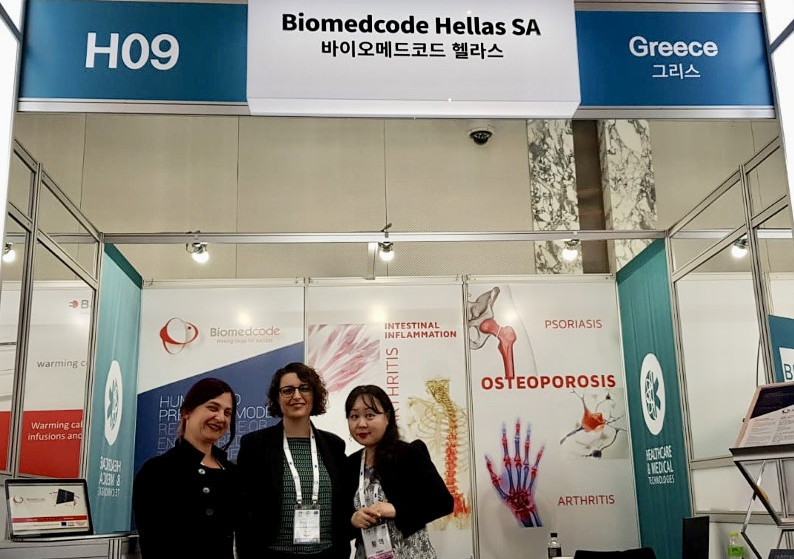The evolution of preclinical testing through novel humanized precision disease models


The evolution of preclinical testing through novel humanized precision disease models

Scientists of Biomedcode present in PLOS Computational Biology a new computational framework revealing key differences between four rheumatoid arthritis medications and their impact on biological pathways in mice.
Published in PLoS Computational Biology 2019 May 9;15(5):e1006933. doi: 10.1371/journal.pcbi.1006933

Biomedcode’ s R&D team participated in the activities of the 1st BSRC Al. Fleming Retreat. R&D projects were presented in three posters and scientific results were discussed with BSRC Al. Fleming scientists. Biomedcode’s overall activities were presented in a regular talk. Read More

Biomedcode has been selected to participate in the Health Care and Medical Technologies Mission to Korea (March 12-14 2019) supported by EU Gateway.

Biomedcode presents an abstract entitled “Characterization Of Novel Humanized Il-17 Preclinical Platforms For The Efficacy Evaluation Of Anti-Human Il17 Therapeutics” in the 39thEuropean Workshop for Rheumatology Research that takes place February 28-March 2 in Lyon France.

Patients with rheumatoid arthritis and spondyloarthritis show higher mortality rates, mainly caused by cardiac comorbidities. The TghuTNF (Tg197) arthritis model develops tumour necrosis factor (TNF)-driven and mesenchymal synovial fibroblast (SF)-dependent polyarthritis. Here, we investigate whether this model develops, similarly to human patients, comorbid heart pathology and explore cellular and molecular mechanisms linking arthritis to cardiac comorbidities.
Published in Annals of Rheumatic Diseases 2018 Jun;77(6):926-934. doi: 10.1136/annrheumdis-2017-212597.

Biomedcode scientists coauthor two publications, one in Annals of Rheumatic diseases and one in JCI insight, showing that Tg197 and TNFΔΑRΕ mice develop heart valve pathology sharing common mesenchymal cell-specific aetiopathogenic mechanisms with arthritis. Read More

Biomedcode is pleased to announce that it has received funding from the European Regional Development Fund of the European Union and Greek national funds through the Operational Program Competitiveness, Entrepreneurship and Innovation, under the call RESEARCH – CREATE – INNOVATE supporting the innovative research network HUPLA that combines the efforts of industrial and renowned academic partners to develop precision drug evaluation tools for the preclinical development of novel therapies for Multiple Sclerosis and Psoriasis. Read More

Mesenchymal TNF signaling is etiopathogenic for inflammatory diseases such as rheumatoid arthritis and spondyloarthritis (SpA). The role of Tnfr1 in arthritis has been documented; however, Tnfr2 functions are unknown. Here, we investigate the mesenchymal-specific role of Tnfr2 in the TnfΔARE mouse model of SpA in arthritis and heart valve stenosis comorbidity by cell-specific, Col6a1-cre-driven gene targeting. We find that TNF/Tnfr2 signaling in resident synovial fibroblasts (SFs) and valvular interstitial cells (VICs) is detrimental for both pathologies, pointing to common cellular mechanisms. In contrast, systemic Tnfr2 provides protective signaling, since its complete deletion leads to severe deterioration of both pathologies. SFs and VICs lacking Tnfr2 fail to acquire pathogenic activated phenotypes and display increased expression of antiinflammatory cytokines associated with decreased Akt signaling.
Published in JCI Insight 2018 Apr 5;3(7):e98864. doi: 10.1172/jci.insight.98864
Read More

Biomedcode’s human TNF transgenic arthritis model, (Tg197), contributes to the non-clinical assessment of adalimumab biosimilar GP2017 with originator Humira. Read More